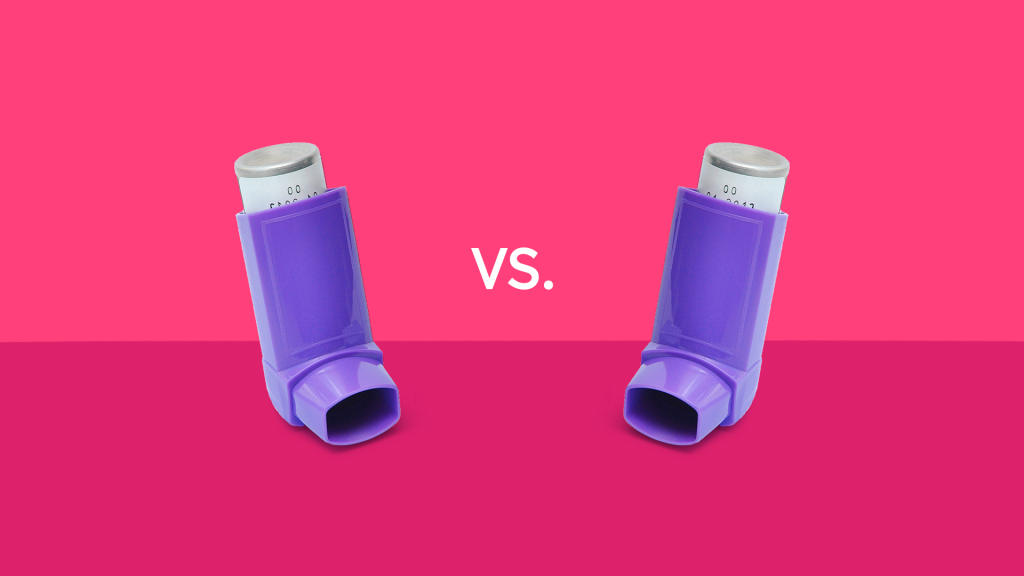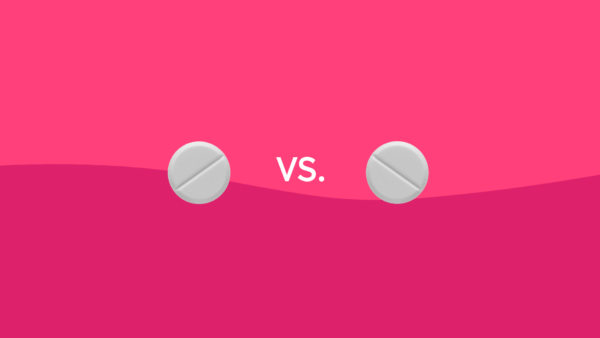Drug overview & main differences | Conditions treated | Efficacy | Insurance coverage and cost comparison | Side effects | Drug interactions | Warnings | FAQ
Qvar and Flovent are brand-name medications used to control and prevent asthma symptoms. They are considered maintenance, or controller, medications that help prevent symptoms like shortness of breath, wheezing, and cough in those with asthma. Qvar and Flovent can only be purchased with a prescription.
Qvar and Flovent belong to a class of medications called inhaled corticosteroids. They work by controlling and reducing inflammation in the lungs and airways. By reducing inflammation in the airways, inhaled corticosteroids can ease breathing problems in someone with asthma. Qvar and Flovent are not rescue inhalers and should not be used for an asthma attack. Read on to learn more about the differences between Qvar and Flovent.
What are the main differences between Qvar and Flovent?
Although they have similar uses, Qvar and Flovent contain different active ingredients. Qvar contains the corticosteroid beclomethasone while Flovent contains the corticosteroid fluticasone.
Both Qvar and Flovent are available in similar formulations; they both come as metered-dose inhalers containing an inhalation aerosol. However, Flovent is also available as a diskus, or dry powder inhaler.
The Qvar Redihaler comes in strengths of 40 or 80 mcg per actuation. The Flovent HFA inhaler is available in strengths of 44, 110, or 220 mcg per actuation and the Flovent Diskus is available in strengths of 50, 100, or 250 mcg per foil blister.
| Main differences between Qvar and Flovent | ||
|---|---|---|
| Qvar | Flovent | |
| Drug class | Inhaled corticosteroid (ICS) | Inhaled corticosteroid (ICS) |
| Brand/generic status | No generic version available | No generic version available |
| What is the generic name? | Beclomethasone dipropionate | Fluticasone propionate |
| What form(s) does the drug come in? | Inhalation aerosol (metered-dose inhaler) | Inhalation aerosol (metered-dose inhaler) Inhalation powder (diskus) |
| What is the standard dosage? | Treatment of asthma in patients aged 12 years and older: 40 mcg or 80 mcg twice daily
Treatment of asthma in patients aged 4 years old to 11 years old: 40 mcg, 80 mcg, 160 mcg, or 320 mcg twice daily |
Flovent HFA Treatment of asthma in patients aged 4 years and older: 88 mcg twice dailyFlovent Diskus Treatment of asthma in patients aged 12 years old: 100 mcg twice daily Treatment of asthma in patients aged 4 to 11 years old: 50 mcg twice daily |
| How long is the typical treatment? | Long-term | Long-term |
| Who typically uses the medication? | Adults and children aged 4 years and older | Adults and children aged 4 years and older |
Conditions treated by Qvar and Flovent
Qvar and Flovent are FDA approved as maintenance treatments for asthma in adults and pediatric patients who are 4 years of age and older. As maintenance treatments, Qvar and Flovent can be used to control and prevent asthma symptoms. Both Qvar and Flovent can also help prevent an asthma attack, or asthma exacerbation.
Qvar and Flovent should be taken daily to control asthma symptoms. It may take up to two weeks for inhaled corticosteroids to reach maximum effectiveness. According to the National Institutes of Health (NIH), some people with mild or moderate persistent asthma may be able to take Qvar or Flovent intermittently, or as needed.
Qvar and Flovent should not be used as rescue inhalers. Inhaled corticosteroids like Qvar and Flovent are typically prescribed with a rescue inhaler like albuterol to help relieve asthma attacks.
| Condition | Qvar | Flovent |
| Asthma | Yes | Yes |
Is Qvar or Flovent more effective?
Both Qvar and Flovent are effective medications for asthma management. The most important factor that determines the effectiveness of either Qvar or Flovent is how often they are used. Inhaled corticosteroids should be used regularly in order to be effective. Otherwise, a person with asthma may experience worsening asthma symptoms or an asthma attack that could result in hospitalization.
One randomized, double-blind clinical trial directly compared beclomethasone dipropionate and fluticasone propionate in almost 400 patients with persistent asthma. By the end of the trial, the use of fluticasone propionate resulted in significantly better improvements in lung function and decreased asthma symptoms compared to beclomethasone dipropionate. Both medications were found to have a similar safety profile.
One meta-analysis found that inhaled corticosteroids are generally effective at low or moderate doses for treating asthma. High-dose corticosteroids produce no additional clinical benefit and may carry an increased risk of adverse effects.
Consult a healthcare provider for the best asthma treatment that works for you. If asthma symptoms do not improve with a corticosteroid alone, a healthcare provider may prescribe a long-acting bronchodilator in combination with a corticosteroid. Combination inhalers include Advair (fluticasone/salmeterol), Dulera (mometasone/formoterol), and Symbicort (budesonide/formoterol).
Coverage and cost comparison of Qvar vs. Flovent
Qvar is not available as a generic medication. Therefore, it can be expensive with an average retail price of around $544. Some Medicare and insurance plans may cover part of the cost of Qvar. Using a discount card from SingleCare may lower the cost of Qvar to approximately $210.
Like Qvar, Flovent is only available in brand-name formulations. However, Flovent may be a cheaper alternative to Qvar. Most Medicare and insurance plans will cover a Flovent prescription. Without insurance, the average cash price of Flovent HFA is $347 and the average cash price of Flovent Diskus is around $279. Using a savings card from SingleCare may help lower the cost of a Flovent HFA or Flovent Diskus inhaler to $217 and $176.
| Qvar | Flovent | |
| Typically covered by insurance? | Yes | Yes |
| Typically covered by Medicare Part D? | Yes | Yes |
| Quantity | 1 inhaler | 1 inhaler |
| Typical Medicare copay | $24–$293 | $3–$297 |
| SingleCare cost | $208+ | $217+ |
Common side effects of Qvar vs. Flovent
Qvar and Flovent share similar side effects. As inhaled corticosteroids, these medications may cause side effects such as upper respiratory tract infections, nasopharyngitis, rhinitis, and sinusitis. Both medications can also cause headache, cough, and nausea, among other side effects.
Qvar or Flovent can cause an increased risk of oral thrush, or fungal infections in the mouth. The mouth should be rinsed with water without swallowing after using an inhaled corticosteroid like Qvar or Flovent. A device called a spacer may be used with the Flovent HFA inhaler to reduce the risk of oral thrush.
Serious side effects of inhaled corticosteroids include paradoxical bronchospasm and hypersensitivity reactions. Paradoxical bronchospasm can occur immediately after using an inhaled corticosteroid and involves symptoms like severe wheezing and shortness of breath. Hypersensitivity reactions like severe rash, swelling, and trouble breathing are possible in those who are allergic to any ingredients in these medications. Seek immediate medical attention if you experience signs and symptoms of bronchospasm or hypersensitivity reactions.
| Qvar | Flovent | |||
| Side effect | Applicable? | Frequency | Applicable? | Frequency |
| Oral thrush | Yes | ≥3% | Yes | >3% |
| Upper respiratory tract infection | Yes | ≥3% | Yes | >3% |
| Nasopharyngitis | Yes | ≥3% | Yes | >3% |
| Rhinitis | Yes | ≥3% | Yes | >3% |
| Sinusitis | Yes | ≥3% | Yes | >3% |
| Headache | Yes | ≥3% | Yes | >3% |
| Cough | Yes | ≥3% | Yes | >3% |
| Nausea | Yes | ≥3% | Yes | >3% |
Frequency is not based on data from a head-to-head trial. This may not be a complete list of adverse effects that can occur. Please refer to your doctor or healthcare provider to learn more.
Source: DailyMed (Qvar), DailyMed (Flovent)
Drug interactions of Qvar vs. Flovent
Inhaled corticosteroids like Qvar and Flovent should be avoided or monitored while taking medications that act as CYP3A4 inhibitors. Taking these medications may increase the blood levels of corticosteroids, which can increase the risk of side effects. Examples of CYP3A4 inhibitors include ritonavir, ketoconazole, and clarithromycin.
Corticosteroids should be avoided or monitored while taking immunosuppressant drugs. Immunosuppressant drugs can weaken the immune system and cause a person to be more susceptible to infections, especially if they are also taking a corticosteroid. Immunosuppressant drugs include azathioprine and cyclosporine. Because they are minimally absorbed into the bloodstream, inhaled corticosteroids may not interact with other drugs as much as oral corticosteroids.
| Drug | Drug Class | Qvar | Flovent |
| Ritonavir Atazanavir Ketoconazole Clarithromycin Indinavir Itraconazole Nefazodone Nelfinavir Saquinavir |
CYP3A4 inhibitors | Yes | Yes |
| Azathioprine Cyclosporine Methotrexate |
Immunosuppressants | Yes | Yes |
Consult a healthcare professional for other possible drug interactions
Warnings of Qvar and Flovent
Inhaled corticosteroids may cause a decrease in bone mineral density, especially during long-term use. Patients with osteoporosis or an increased risk of osteoporosis should avoid corticosteroids or be monitored throughout treatment.
Inhaled corticosteroids can suppress the immune system and increase the risk of infections, especially when used in high doses for long periods of time. Patients who are vulnerable to infections should avoid inhaled corticosteroids or be monitored throughout treatment.
Inhaled corticosteroids can cause an increased risk of glaucoma and cataracts. Patients with a history of increased intraocular pressure or blurred vision should be monitored while using an inhaled corticosteroid like Qvar or Flovent.
Talk to a healthcare provider about other possible warnings and precautions before using an inhaled corticosteroid.
Frequently asked questions about Qvar vs. Flovent
What is Qvar
Qvar is an inhaled corticosteroid medication used to control and prevent symptoms of asthma. It is available as an inhalation aerosol in a metered-dose inhaler. Qvar is manufactured by Teva Pharmaceuticals. Qvar contains beclomethasone and is usually taken twice daily to treat asthma.
What is Flovent?
Flovent is an inhaled corticosteroid medication used to manage and prevent asthma symptoms. It is available as an inhalation aerosol or an inhalation powder. Flovent is manufactured by GlaxoSmithKline. It contains fluticasone and is usually taken twice daily to treat asthma.
Are Qvar and Flovent the same?
Qvar and Flovent both contain a corticosteroid, but they are not the same. Qvar contains beclomethasone and Flovent contains fluticasone. Qvar and Flovent also come in different formulations; Qvar is available as an inhalation aerosol while Flovent is available as an inhalation aerosol and inhalation powder.
Is Qvar or Flovent better?
Qvar and Flovent are both effective medications for asthma control. Some studies suggest that Flovent is more effective at lower doses than Qvar. However, both medications have similar side effects. The most effective inhaled corticosteroid is the one that is used regularly to control and prevent asthma symptoms. Consult a healthcare provider for the best asthma medication for you.
Can I use Qvar or Flovent while pregnant?
There is no sufficient data to show that Qvar or Flovent is completely safe or harmful during pregnancy. However, because inhaled corticosteroids have limited absorption in the bloodstream, they are considered to be generally safe during pregnancy. Consult a healthcare provider for the best asthma treatment options while pregnant.
Can I use Qvar or Flovent with alcohol?
There are no known drug interactions with alcohol and Qvar or Flovent. However, alcohol consumption has been reported to be a trigger for asthma symptoms in some individuals. Talk to a healthcare provider about whether it is safe to drink alcohol while taking an inhaled corticosteroid like Qvar or Flovent.
What type of inhaler is Qvar?
Qvar is a maintenance inhaler for asthma that contains a corticosteroid called beclomethasone. It should be used consistently on a daily basis for maximum effectiveness. As an inhaled corticosteroid, Qvar may not start providing the most benefit until one to two weeks after starting treatment.
What is the best steroid inhaler for asthma?
The best steroid inhaler is one that you use regularly in order to prevent and control asthma symptoms. Inhaled corticosteroids include Alvesco (ciclesonide), Qvar (beclomethasone), Flovent (fluticasone), Pulmicort (budesonide), and Asmanex (mometasone). The effectiveness of the medication will depend on the formulation and dosage. Other factors such as side effects and cost should also be taken into consideration when choosing the best steroid inhaler for asthma. Talk to a healthcare provider to determine the best steroid inhaler for you.
Does Qvar affect your immune system?
Qvar contains a corticosteroid called beclomethasone, which can suppress, or weaken, the immune system. Like other corticosteroids, Qvar should be used with caution or avoided in patients who are immunocompromised or currently taking immunosuppressants. There may be an increased risk of worsened infections while taking corticosteroids. Those with a history of tuberculosis, fungal, bacterial, viral, or parasitic infections may be recommended to use corticosteroids with caution.





